UTILIZATION OF MULTICULTURAL KNOWLEDGE ASSETS IN BUILDING RELIGIOUS MODERATION AT THE ISLAMIC STATE UNIVERSITY OF DATOKARAMA PALU
Abstract
This study examines the prominent role of multicultural knowledge assets to be managed and utilized in supporting the success of the religious moderation program in Islamic universities, specifically the State Islamic University of Datokarama Palu. The university was chosen based on its background which focuses on the religious moderation aspect. This study aims to reveal the utilization of multicultural knowledge assets owned by the State Islamic University of Datokarama Palu to build religious moderation. One of the knowledge assets possessed is a multicultural intellectual asset. The method of the study was the qualitative method with a phenomenological approach. The data collection techniques used were interviews and documentation. This study produced several findings, namely; (1) multicultural knowledge does not only come from internal human resources personnel but also the knowledge that is institutional and sourced from external; (2) that multicultural knowledge is relevant to be utilized in the context of building religious moderation based on respect for cultural and religious diversity. However, in several programs, the State Islamic University of Datokarama Palu has not fully utilized the assets of multicultural knowledge. The two seem to be separated from the religious moderation development program. Despite that, both are integral units that need and support each other to build a moderate-academic social life at educational institutions.
Downloads
References
Aziz, Aceng Abdul, Anis Masykhur, Ahmad Khoirul Anam, Ali Muhtarom, Idris Masudi, dan Masduki Duryat. Implementasi Moderasi Beragama dalam Pendidikan Islam. Diedit oleh Papay Supriatna, Alip Nuryanto, dan Saepullah. Kelompok Kerja Implementasi Moderasi Beragama Direktorat Jenderal Pendidikan Islam Kementerian Agama Republik Indonesia Bekerjasama dengan Lembaga Daulat Bangsa, 2019.
Azra, Azyumardi. “Islam Indonesia Inklusif vs Eksklusif: Dinamika Keberagaman Umat Muslimin.” Makalah Pengajian Ramadhan PP. Muhammadiyah. Kampus Universitas Muhammadiyah Jakarta, 2017.
Badan Litbang dan Diklat Kementerian Agama. Moderasi Beragama. Jakarta: Jakarta: Kementerian Agama RI, 2019.
Bagir, Haidar. Islam Tuhan, Islam Manusia: Agama dan Spiritualitas di Zaman Kacau. Bandung: Mizan, 2017.
Banks, J. A. “The Canon Debate, Knowledge Construction, and Multicultural Education.” Educational Researcher 22, no. 5 (1993): 4–14. doi:10.3102/0013189X022005004.
Basile, Carole G. Intellectual capital: The intangible assets of professional development schools. SUNY Press, 2010.
Bourdieu, Pierre. “Pierre Bourdieu 1986 - The forms of capital.” Handbook of Theory and Research for the Sociology of Education, 1986, 241–58.
Chatzkel, Jay L. Knowledge capital: How knowledge-based enterprises really get built. Oxford University Press, 2003.
Coleman, James S. “Social capital in the creation of human capital.” In Knowledge and Social Capital, 17–42, 2009. doi:10.1086/228943.
Flamholtz, Eric. “Corporate culture and the bottom line.” European Management Journal 19, no. 3 (2001): 268–75.
Futaqi, Sauqi. “Kompetensi Multikultural Untuk Melahirkan Keunggulan Beragam Bagi Lembaga Pendidikan Islam.” TA’LIM: Jurnal Studi Pendidikan Islam 1, no. 1 (2018): 1–18.
———. “Konstruksi Moderasi Islam (Wasathiyyah) dalam Kurikulum Pendidikan Islam.” In PROCEEDINGS: Annual Conference for Muslim Scholars, 521–30, 2018.
Futaqi, Sauqi, dan Saepudin Mashuri. “RELIGIOUS MODERATION CYBER: SEBUAH STRATEGI PENGARUSUTAMAAN MELALUI LITERASI MEDIA BARU.” Tatar Pasundan: Jurnal Diklat Keagamaan 15, no. 2 (2021): 182–95.
Gorski, Paul C. “The challenge of defining multicultural education.” Tersedia [online] juga di http://www. edchange. org/multicultural/initial. html [diakses pada tanggal 10 Desember 2020], 2010.
Hasan, Muhammad Tholchah. “Pendidikan multikultural sebagai opsi penanggulangan radikalisme.” Malang: Lembaga Penerbitan UNISMA, 2016.
Hilmy, Masdar. “Whither Indonesia’s Islamic Moderatism? A reexamination on the moderate vision of Muhammadiyah and NU.” Journal of Indonesian Islam 7, no. 1 (2013): 24–48.
Hsia, Hsiao-Chuan. “From ‘social problems’ to ‘social assets’: geopolitics, discursive shifts in children of Southeast Asian marriage migrants, and mother-child dyadic citizenship in Taiwan.” Citizenship Studies, 2021, 1–20.
Kamali, Mohammad Hashim. The middle path of moderation in Islam: The Qur’anic principle of wasatiyyah. Oxford University Press, 2015.
Kuntowijoyo. “Interpretasi untuk Aksi.” Bandung: Mizan, 2008.
Lee, David, dan Abigail Gilmore. “Mapping cultural assets and evaluating significance: Theory, methodology and practice.” Cultural Trends 21, no. 1 (2012): 3–28.
Litschka, Michael, Andreas Markom, dan Susanne Schunder. “Measuring and analysing intellectual assets: an integrative approach.” Journal of intellectual capital, 2006.
Matas, Cristina Poyatos, dan Susan Bridges. “Framing multicultural capital to understand multicultural education in practice.” International Journal of Learning 16, no. 10 (2009): 379–96.
Qardhawi, Yusuf. “al-Kalimat fi al-Wasathiyah al-Islamiyah wa Ma’alimaha.” Cairo: Dar al-Shuruq, 2011.
Rooney, Paul K. “A cultural assets model for school effectiveness.” Cambridge Journal of Education 48, no. 4 (Juli 2018): 445–59. doi:10.1080/0305764X.2017.1356266.
Shen, Jie, Ashok Chanda, Brian D’netto, dan Manjit Monga. “Managing diversity through human resource management: An international perspective and conceptual framework.” The International Journal of Human Resource Management 20, no. 2 (2009): 235–51.
Throsby, David. “Cultural capital and sustainability concepts in the economics of cultural heritage.” In Economics of Cultural Heritage, 101–17. Getty Conservation Institute, 2002.
Zembylas, Michalinos, dan Sotiroula Iasonos. “Leadership styles and multicultural education approaches: An exploration of their relationship.” International Journal of Leadership in Education 13, no. 2 (2010): 163–83. doi:10.1080/13603120903386969.
Zembylas, Michalinos, dan Loizos Loukaidis. “Affective practices, difficult histories and peace education: An analysis of teachers’ affective dilemmas in ethnically divided Cyprus.” Teaching and Teacher Education 97 (2021): 103225. doi:https://doi.org/10.1016/j.tate.2020.103225.
Copyright (c) 2023 Paedagogia: Jurnal Pendidikan

This work is licensed under a Creative Commons Attribution-NonCommercial 4.0 International License.
The author agrees to the following conditions upon publishing a work to Paedagogia: Jurnal Pendidikan:
1. Each article is licensed under a Creative Commons Attribution-NonCommercial 4.0 International License. The author(s) recognizes that Paedagogia: Jurnal Pendidikan has the right to be the first to publish under a Creative Commons Attribution-NonCommercial 4.0 International License. This license permits the copying and redistribution of this material in any form or format, as well as the composition, modification, and creation of derivative works of this material for any purpose, but Non commercial, as long as the author is credited with the original work.
2. Authors may submit articles separately or arrange for non-exclusive distribution of manuscripts previously published in this journal in other forms (e.g., to the author's institutional repository, publication in books, etc. ), provided that the manuscript is acknowledged as having been published first in the Paedagogia: Jurnal Pendidikan.
3. A copyright submission agreement must attach each approved manuscript prior to publication. You may obtain the form for the copyright submission agreement here (INA) (EN).








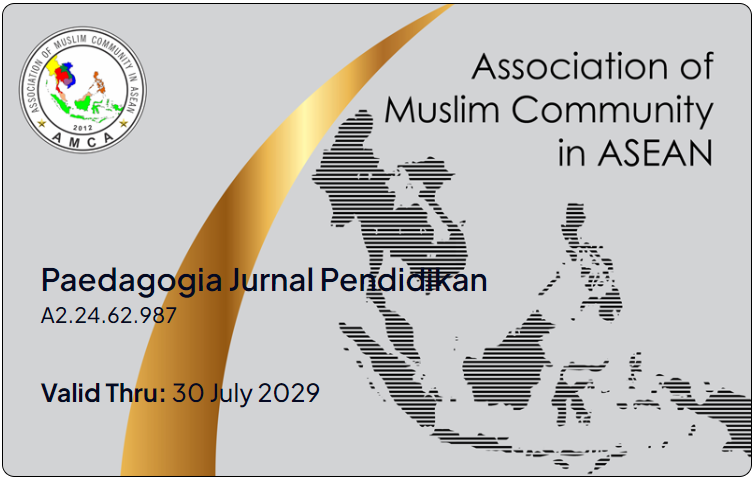




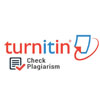










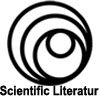






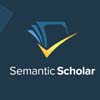
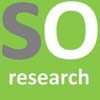
 This work is licensed under a
This work is licensed under a 